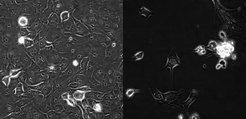New SARS-CoV-2 variant escapes antibodies
Antibodies from blood from previously infected people can only neutralize the 501Y.V2 variant from South Africa at significantly higher concentrations
Between October and November of 2020, 501Y.V2 was detected in South Africa - a variant that has become the predominant variant in the country. However, how the mutations found in 501Y.V2 affect the ability of antibodies from previously infected people to recognize and inhibit the new variant was unknown until now. Scientists from the Max Planck Research Group at the Africa Health Research Institute in Durban, South Africa, have now discovered that the antibodies of patients who were infected with SARS-CoV-2 in the first wave of infections in South Africa are less able to neutralize 501Y.V2. This finding suggests that the virus variant could increase the risk of re-infections. How 501Y.V2 affects the vaccines developed so far still not understood but these results are a cause for concern.

Antibodies made after natural infection with SARS-CoV-2 predominantly target the viral Spike protein, which is the part of the virus used to bind to a receptor called ACE2 on cells. This binding allows the virus to enter cells, and antibodies can block this entry, preventing the virus from accessing the cellular machinery it needs to replicate itself. Current vaccines also target the Spike protein and allow such neutralizing antibodies to be made before infection takes place. This stops the virus from establishing an infection.
The scientists investigated whether this variant can be neutralized by antibodies produced after infection with variants from the first wave of the epidemic in South Africa which peaked in July of 2020. To do this, they used live virus to determine the amount of blood plasma, which contains the antibodies, required to neutralize 501Y.V2.
Lower sensitivity to previous immunity
"Compared to the first-wave variant, we needed about a tenfold higher plasma concentration to neutralize 501Y.V2. This suggests that the mutations in the new variant have lost sensitivity to previous immunity", says Alex Sigal, a Research Group Leader at the Max Planck Institute for Infection Biology whose lab is based in Durban.
It is still unclear whether previous immunity or vaccines will work less well, but this data is a cause for concern. "The ability of the virus to evolve has been underestimated", says Sigal.
The Max Planck Research Group at the Africa Health Research Center is intended to closely link basic research and clinical studies. The respective expertise at the Max Planck Institute for Infection Biology and the Africa Health Research Institute offer ideal conditions for this. "Findings from the laboratory can stimulate studies with patients and vice versa. The current results confirm how important this is", says Stefan Kaufmann, who co-initiated the founding of the research group in 2012 and is now director emeritus at the Max Planck Institute for Biophysical Chemistry in Göttingen.
